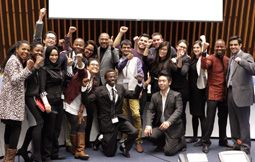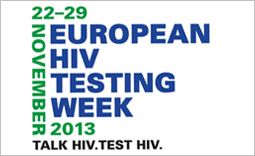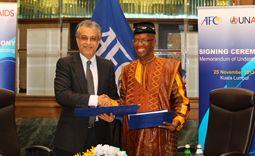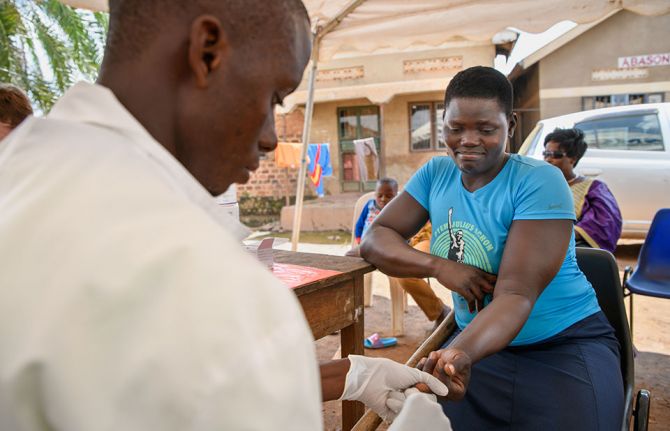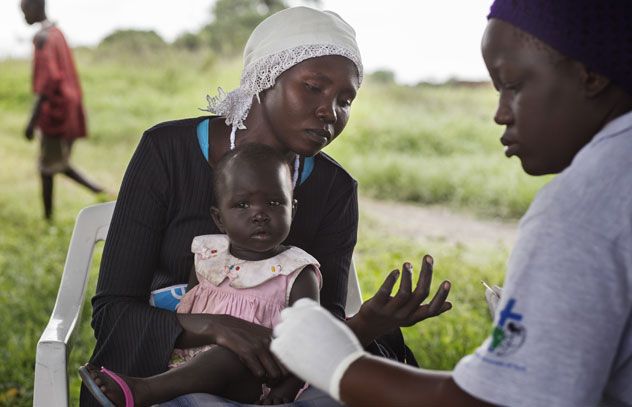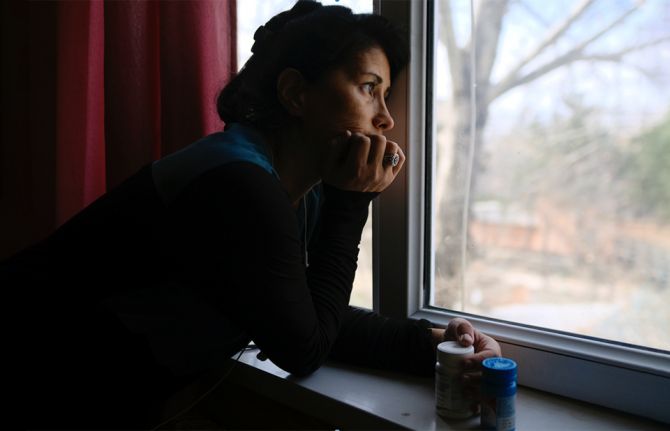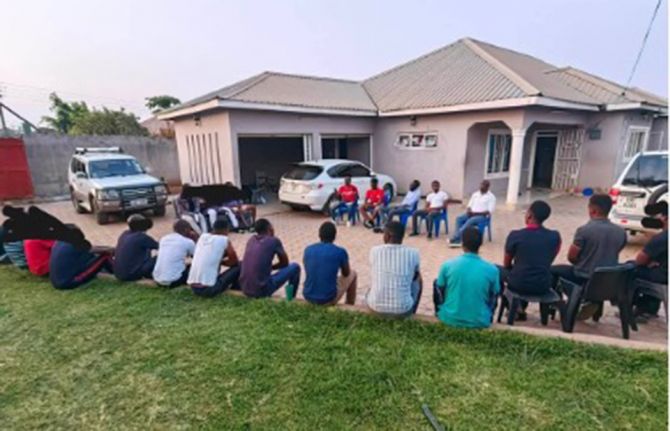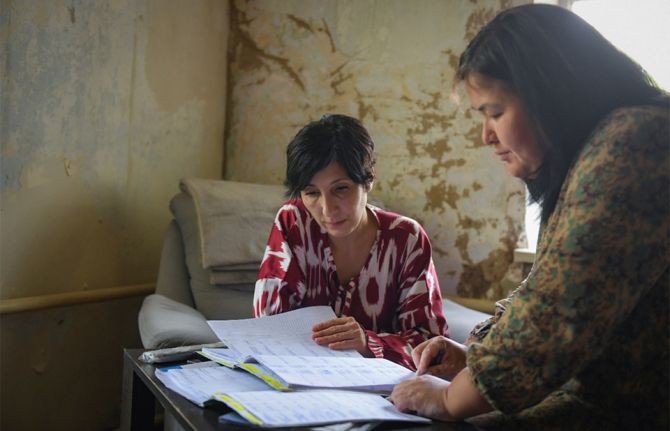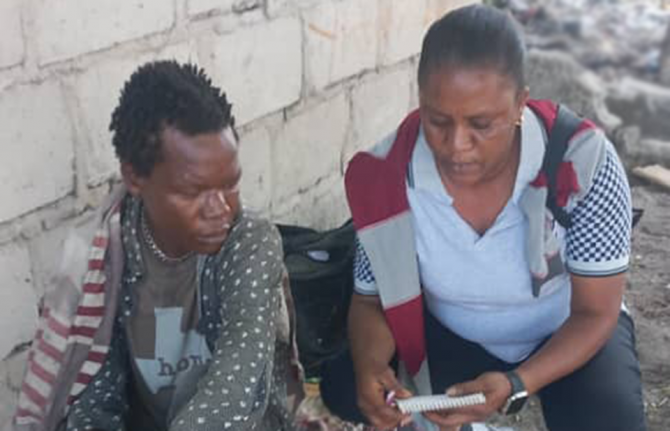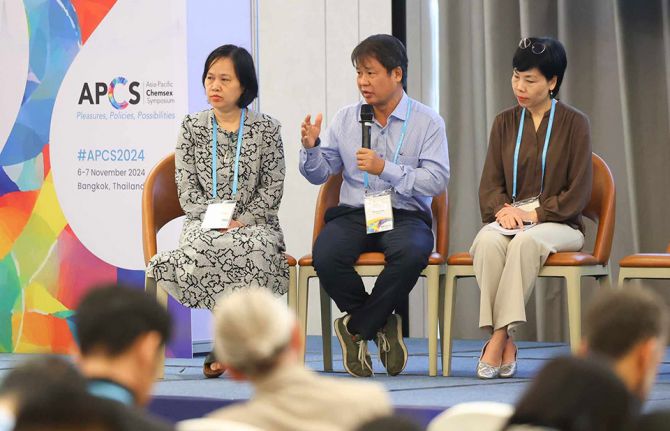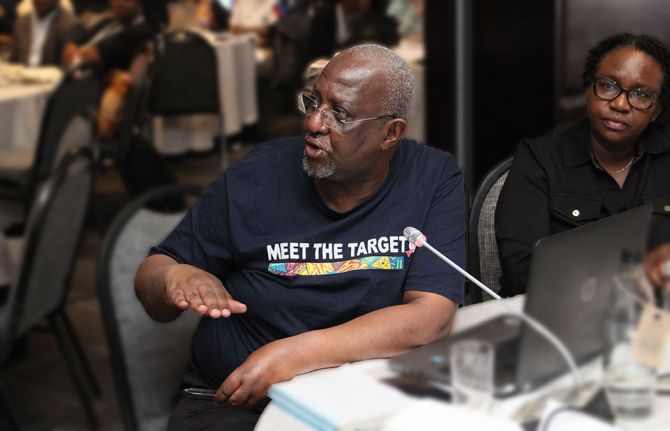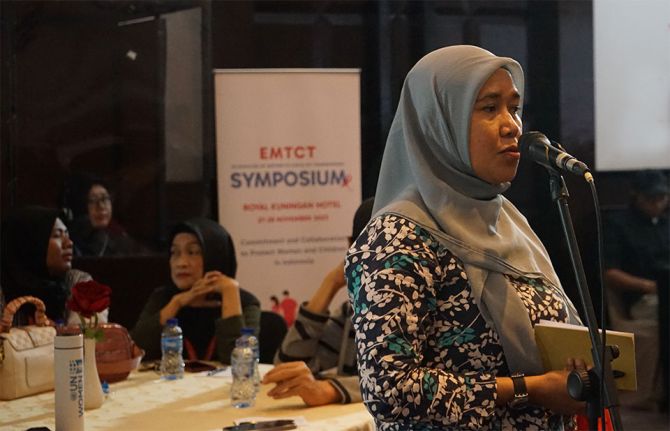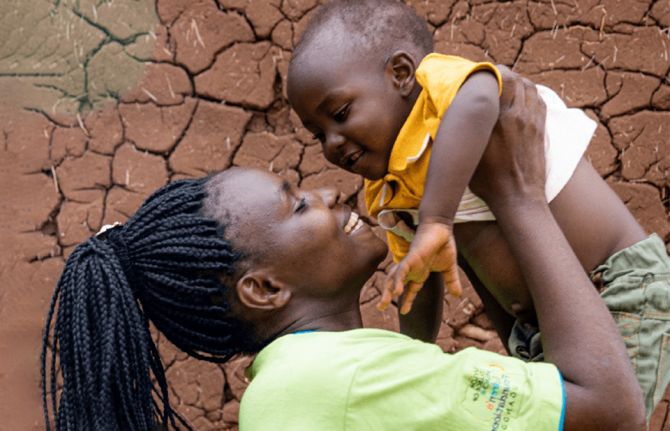
Feature Story
Young people interpret new UNAIDS data
22 July 2010
22 July 2010 22 July 2010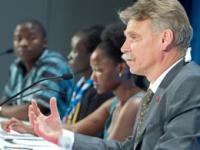 Dr Peter Ghys, Chief of Epidemiology and Analysis Division UNAIDS, presented the findings of the new analysis together with the Vienna Youth Force at the International AIDS Conference. Credit: UNAIDS/Anne Rauchenberger
Dr Peter Ghys, Chief of Epidemiology and Analysis Division UNAIDS, presented the findings of the new analysis together with the Vienna Youth Force at the International AIDS Conference. Credit: UNAIDS/Anne RauchenbergerA change is happening among young people across the world, especially in parts of sub-Saharan Africa. Young people are waiting longer to become sexually active, have fewer multiple partners and are increasingly using condoms among those with multiple partners. As a result, HIV prevalence among young people is dropping in many key countries according to a new analysis by UNAIDS.
Dr Peter Ghys, Chief of Epidemiology and Analysis Division UNAIDS, presented these findings together with the Vienna Youth Force today at the International AIDS Conference.
The study shows that HIV prevalence trends in 16 countries is declining among young people aged 15–24, and according to the study declines are largely due to falling new HIV infections among young people. In 15 out of 21 countries most affected by HIV in the world, a decline of 25% has been noted.
According to Dr Ghys, the results show a good concordance between trend in sexual behaviour and trends in HIV prevalence.
“UNAIDS calls on countries to implement comprehensive set of programmes to reduce the risk of young people; and young people themselves can and must be actors in these changes,” said Dr Ghys.
Young people engaged in the AIDS response in countries which are experiencing this decline were invited to comment on the new findings.
Kuena Diaho, the World Young Women’s Christian Association Lesotho, said that programmes targeting young people need to be shaped in a way so that they are not too heavy. “In Lesotho, we do edutainment; HIV prevention activates through poetry and sport. This way, it’s a little less heavy,” said Diaho.
“We’re a large network of young women’s organizations. We use facebook to share information, and we organize gatherings to talk about sexual and reproductive health education,” said Yvonne Akotho from the Girl scouts in Kenya.
Remmy Shawa, UNAIDS special youth fellow, from Zambia stressed that this new evidence should be used as an advocacy tool to show leaders what happens when young people are placed at the centre of the AIDS response.
Dr Ghys concluded the session noting that these encouraging results are an early return on investments made in HIV prevention. “These investments need to continue and programmes with and for young people need to be scaled up,” said Dr Ghys.
Right Hand Content
Publications:
Young people are leading the HIV prevention revolution
UNAIDS Outlook Report 2010 (pdf, 6 Mb)
UNAIDS Outcome Framework 2009-2011 (pdf, 388 Kb)
Related
 “Who will protect our young people?”
“Who will protect our young people?”

02 June 2025

Feature Story
Communities in South Asia show how stigma and discrimination can be transformed
22 July 2010
22 July 2010 22 July 2010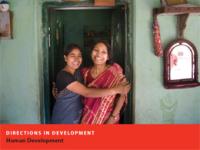 Credit: World Bank
Credit: World BankStigma and discrimination are widely recognised as two of the major barriers to an effective and successful AIDS response. But how, with both often entrenched and hard to challenge, can they be meaningfully addressed? The World Bank and The International Center for Research on Women (ICRW) focused on this central question during a satellite session at the XVIII International AIDS Conference in Vienna entitled: Making the case for stigma-reduction and moving to action, the experience of South Asia.
Stigma reduction
The session made the case for stigma reduction as a critical strategy for effective HIV prevention and treatment programmes, with a range of speakers sharing the latest evidence on why investing in stigma-reduction is critical for effective HIV programming.
The results from the South Asia Region Development Marketplace, (SARDM) were a key focus. Spearheaded by the World Bank in 2008, this competitive grants programme identified and supported small scale, community-driven, projects demonstrating a creative approach to reducing stigma and discrimination. An innovative range of interventions included beauty pageants, traditional folk art and a restaurant run by sex workers. There is also a theatre programme designed to change attitudes that make it harder for men who have sex with men to access legal redress; a project challenging internalised stigma among injection drug users, helping them get back on their feet economically and socially, and a radio programme produced by journalists living with HIV featuring positive role models.
Experiences of what works for successful community-based stigma reduction were shared by a number of the implementers.
“These remarkable programmes have now touched the lives of 100,000 people across South Asia,” said Mr Michal Rutkowski, the World Bank’s Director for Human Development in South Asia.
“The results have been very impressive. We have learned about tried and true ideas that really work. Our hope is that we can persuade government and community leaders and others to take these on-board and expand them and take them nationwide.”
The satellite session provided an opportunity to launch a new global network for action on stigma and discrimination and the World Bank report detailing the full extent of the SARDM programme with its successes and challenges.
Writing in the introduction to the publication, UNAIDS Executive Director, Mr Michel Sidibé, pointed out the significance of community empowerment. “When communities assume leadership of their own programmes, they become equitable and sustainable. It breaks the cycle of stigma and discrimination. It restores their dignity and rights to good health and development.”
Right Hand Content
Cosponsors:
Partners:
International Center for Research on Women (ICRW)
Feature stories:
World Bank highlights potential risks of AIDS to economic and social development in South Asia (05 March 2010)
Publications:
UNAIDS Outlook Report 2010 (pdf, 6 Mb)
UNAIDS Outcome Framework 2009-2011 (pdf, 388 Kb)
The World Bank: Tackling HIV-related stigma and discrimination in South Asia
HIV and AIDS in South Asia: An Economic Development Risk
Related

Feature Story
“Right for you!” Satellite puts young people centre stage at Vienna
22 July 2010
22 July 2010 22 July 2010 Right for you! satellite. Credit: UNAIDS/Anna Rauchenberger
Right for you! satellite. Credit: UNAIDS/Anna RauchenbergerThe thoughts and voices of young people took centre stage at the Vienna AIDS Conference yesterday as an innovative satellite session explored how they can best protect themselves from HIV. The session was organized by UNAIDS, UNESCO, UNFPA, UNICEF and WHO. It provided an interactive platform for youth from around the world to discuss sexual and reproductive health services and provision of comprehensive information including sexuality education, condom use and HIV counselling and testing.
Called ‘Right for You! Creating Game Changing Strategies for HIV and Young People’, the event was structured around the outcome of an online survey, promoted across varied social media platforms, such as Facebook, Twitter, AIDSspace and Conversations for a better world, to find out what young people really think about how to mount a meaningful and effective personal challenge to HIV. It was moderated by Ms Purnima Mane, United Nations Population Fund (UNFPA) Deputy Executive Director (Programme).
The session explored how to achieve three bold goals for young people:
- Ensure at least 80% of young people in and out school have comprehensive knowledge of HIV.
- Double young people’s use of condoms during their last sexual intercourse.
- Double young people’s use of HIV testing and counselling services.
‘Empowering Young People to Protect Themselves against HIV’, is one of the priority areas of the UNAIDS Outcome Framework 2009-2011. The aim is to reduce new HIV infections among young people by 30% by 2015.
The three goals discussed in yesterday’s satellite are far-reaching and ambitious in scope. They were highlighted in the UNAIDS business case on empowering young people. The business case is an advocacy tool which outlines why UNAIDS has prioritized young people and it recommends that the three results should be achieved in at least 9 of the 17 countries that have largest number of young people living with HIV by 2011, as well as in countries experiencing low and concentrated epidemics.
Those gathered at the event discussed how such results can be achieved and how the necessary good quality programmes can be scaled up at country level. An expert panel that included a youth facilitator, Ishita Chaudhry from India, Dr Doug Kirby, co-author of International Technical Guidance on Sexuality Education: An evidence informed approach for schools, teachers and health educators, Darlington Muyambwa, Programme Manager, SAYWHAT Programme, Zimbabwe , and Shaffiq Essajee, WHO, responded to feedback from participants who expressed their views or asked questions via the web forums.
Exploring ways of empowering young people to protect themselves against HIV is vitally important given latest estimates showing that 15-24 year olds account for some 40% of all adult HIV infections globally. In 2007, far fewer than half of young people around the world had accurate knowledge about HIV.
Additionally, in many parts of the world young people have inadequate access to sexual and reproductive health services and commodities like condoms. Socio-cultural norms can act as barriers to these essential services and commodities which discourage young people from learning about and discussing sex and sexuality and accessing the services. The session explored ways to address these challenges and empower young people to make informed decisions about this key aspect of their lives.
Right Hand Content
Related

Feature Story
Red Ribbon Award 2010: Exceptional community AIDS leaders and activists recognized
22 July 2010
22 July 2010 22 July 2010 Ms Jan Beagle, UNAIDS Deputy Executive Director, Management and External Relations Branch, addressed the ceremony on behalf of the Executive Director. Credit: UNAIDS/Anna Rauchenberger
Ms Jan Beagle, UNAIDS Deputy Executive Director, Management and External Relations Branch, addressed the ceremony on behalf of the Executive Director. Credit: UNAIDS/Anna RauchenbergerA ceremony to celebrate the 25 winners of the 2010 Red Ribbon Award was held in Vienna 21 July, with a host of global AIDS leaders joining the award winners and some 250 guests. The award event, which included a formal gala dinner, took place during the XVIII International AIDS Conference. Mr Jeffrey O’Malley, Director of HIV/AIDS Practice at the United Nations Development Programme, (UNDP), filled the role of Master of Ceremonies and Ms Jan Beagle, UNAIDS Deputy Executive Director, Management and External Relations Branch, addressed the ceremony on behalf of the Executive Director.
Ms Beagle paid tribute to this year’s winners and the wider community who play a key role in making a difference.
“The AIDS response counts on community organizations. The Red Ribbon Award is one of the rare opportunities we have for celebrating those exceptional organizations and individuals," said Ms Beagle. "The twenty-five organizations we are celebrating tonight are making an essential contribution to reaching our vision: Zero! zero! zero!"
The winners, representing a broad range of community-based organizations from 17 countries, were recognized for their outstanding work in reducing the spread and impact of AIDS. The Red Ribbon Award, named after the vivid symbol of the global response to the epidemic, is a joint effort of the UNAIDS family and is hosted by UNDP.
Chosen for their remarkable efforts in innovation, creativity, impact, sustainability and leadership, each winner receives a cash award and international acknowledgement of their contribution to the strengthening of the AIDS response.
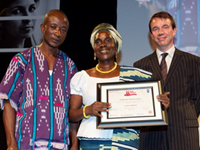 Red Ribbon Awards. Credit: UNAIDS/Anna Rauchenberger
Red Ribbon Awards. Credit: UNAIDS/Anna RauchenbergerSix special recognition winners were announced during the ceremony, one for each of five 2010 award categories and one extraordinary winner:
- Ensuring that people living with HIV receive treatment
Winner: Penitentiary Initiative, Ukraine - Supporting HIV prevention, treatment and care programmes for people who use drugs
Winner: Spin Plus, Tajikistan - Supporting human rights
Winner: Nikat, Ethiopia - Stopping violence against women and girls and promoting gender equality
Winner: POWA, Belize - Enhancing social support for those affected by HIV, including orphans and vulnerable children
Winner: Widows, orphans and people living with HIV (WOPHA), Sudan
An exceptional award was also given:
- AIDS and the Millennium Development Goals
Winner: NAIRN, Thailand
 Ms Elizabeth Matake, Special Envoy of the UN Secretary-General for AIDS in Africa. Credit: UNAIDS/Anna Rauchenberger
Ms Elizabeth Matake, Special Envoy of the UN Secretary-General for AIDS in Africa. Credit: UNAIDS/Anna RauchenbergerLeaders of the global AIDS response taking part in the ceremony included, Prof Michel Kazatchkine, Executive Director of the Global Fund to Fight AIDS, Tuberculosis and Malaria; Ms Elizabeth Mataka, Special Envoy of the UN Secretary-General for AIDS in Africa; Ms Svetlana Izambaeva, Russian activist and advocate, giving the key note address; and Ms Anandi Yuvaraj, Asia-Pacific Regional Coordinator of the International Community of Women Living with HIV/AIDS (ICW).
Out of 720 nominations from over 100 countries, the winners were selected by a Technical Review Committee of civil society representatives who are experts in the community response to HIV.
According to Jeffrey O’Malley, “These organizations clearly demonstrate that effective responses to the epidemic require the full participation of front-line, community-based groups. Community groups recognise that AIDS is one of many issues that are tied together. They understand that AIDS requires an exceptional response but they also understand that you need to link AIDS to broader issues of health, development and justice to be effective.”
Right Hand Content
Publications:
UNAIDS Outlook Report 2010 (pdf, 6 Mb)
UNAIDS Outcome Framework 2009-2011 (pdf, 388 Kb)
Related
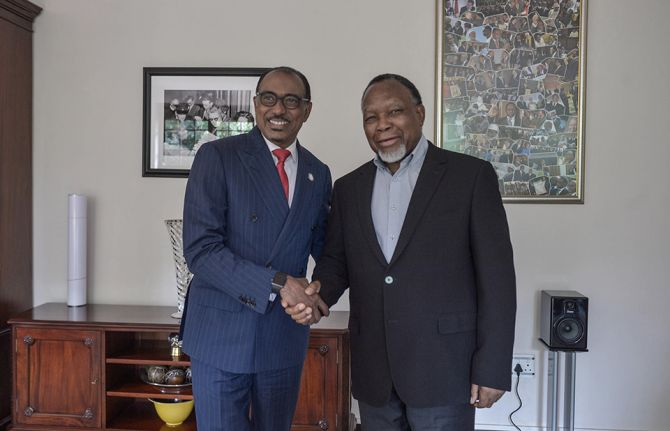 Keeping up the momentum in the global AIDS response
Keeping up the momentum in the global AIDS response

24 April 2019
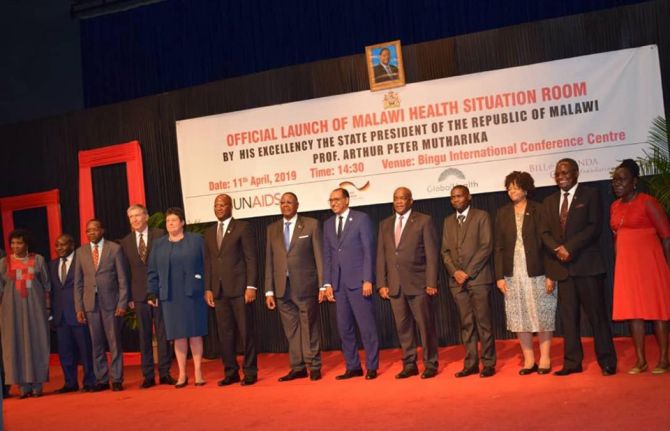 Malawi launches its health situation room
Malawi launches its health situation room

12 April 2019
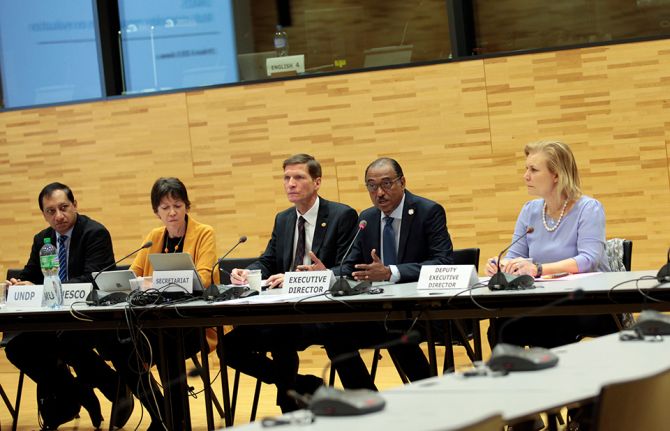 Learning lessons on evaluation
Learning lessons on evaluation

02 April 2019

Feature Story
Country perspectives on AIDS and disabilities
22 July 2010
22 July 2010 22 July 2010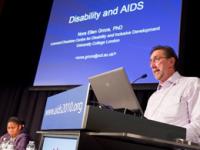 Dr Paul De Lay, Deputy Executive Director of UNAIDS was one of the keynote speakers at the event. Credit: UNAIDS/Anne Rauchenberger
Dr Paul De Lay, Deputy Executive Director of UNAIDS was one of the keynote speakers at the event. Credit: UNAIDS/Anne RauchenbergerWhile there is a growing recognition of the interrelationships between disability and HIV, people with disabilities still lack access to HIV prevention information, treatment, care and support services.
In order to raise awareness on these gaps, as well as provide a platform for exchange of good practice and innovative advocacy ideas, there is a disability and HIV networking zone at this year’s International AIDS Conference and a range of events on the conference calendar.
On 21 July a satellite session was convened by Health Canada in collaboration with the Global Partnership for Disability and Development (GPDD), to look more specifically at the integration of HIV and disability issues into HIV programmes at the country level.
Dr Paul De Lay, Deputy Executive Director of UNAIDS was one of the keynote speakers at the event.
He described UNAIDS’ work with WHO and the Office of the UN High Commissioner for Human Rights to develop a Policy Brief on HIV and Disability. This was achieved with valuable inputs from organizations representing people with a disability, networks of people living with HIV, UNAIDS Reference Group on HIV and Human Rights, and a number of others.
The policy brief gives recommendations for governments, civil society and the UN, for a range of challenges currently in the response to AIDS and disabilities.
These challenges include:
- Persons with disabilities are not included in most HIV policies/processes; people living with HIV not included in most disability policies/processes.
- Some policies exist on HIV and disability and there is mention in national strategies, but implementation is weak and often does not go beyond project level.
- Strategies and programmes fail to adequately address how disability affects men and women differently
- Training for health and other professionals is insufficient
- Data are weak or totally absent (prevalence, incidence, programme needs/coverage) and research is insufficient. Existing research is not being translated into programmes/action.
Dr De Lay noted that a key challenge is to ensure that organizations representing people with a disability are part of the development of National Strategic Plans on HIV and, where it exists, the national partnership forum.
Dr De Lay emphasized that “a normal part of “doing business” in today’s HIV response should be ensuring the full accessibility of mainstream services and information. Standalone programmes should be used where the community says that this is the best way to address our needs. This agenda needs to be planned for, fully funded, and evaluated,” he continued.
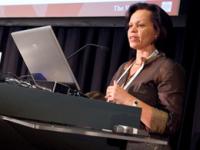 Elizabeth Lule addresses the Disability and AIDS event. Credit: UNAIDS/Anne Rauchenberger
Elizabeth Lule addresses the Disability and AIDS event. Credit: UNAIDS/Anne RauchenbergerProfessor Nora Groce of University College London moderated the event. Mr Stephen Lewis of AIDS Free World also was a keynote speaker. Other participants included Elizabeth Lule; Specioza Mwankina, chairperson and founder of the Network of Disabled People Living with HIV; Steven Estey, Disabled Peoples International; and Rosangela Berman Bieler, of Inter-American Institute on Disability and Inclusive Development (IIDI).
Hendrietta Bogopane-Zulu, Deputy Minister of Public Works, South Africa underlined that the Treatment 2.0 approach is important agenda as simplified treatment regimens and services closer to where people are would make a huge difference to the lives of people with disabilities who are living with HIV.
There was a consensus in the discussions on the need for enhanced collaboration between development actors, donors, national partners, and civil society to foster the scale-up, integration and development of inclusive HIV programmes for persons with disabilities.
People with a disability
Around 650 million people, or 10% of the world’s population, have a disability. Although people with disabilities are found within the populations at higher risk of exposure to HIV, not much attention has been paid in the past to the relationship between HIV and disability.
Persons with disabilities experience all of the risk factors associated with HIV, and are often at increased risk because of poverty, severely limited access to education and health care, lack of information and resources, lack of legal protection, increased risk of violence and rape, vulnerability to substance abuse, and stigma.
Right Hand Content
External links:
Global Partnership for Disability and Development
HEARD Disability and HIV resource centre
Health Canada
Publications:
Policy Brief on HIV and Disability (UNAIDS/WHO/OHCHR)
HIV/AIDS and Disability: Final Report of the 4th International Policy Dialogue (Health Canada)
UNAIDS Outlook Report 2010 (pdf, 6 Mb)
UNAIDS Outcome Framework 2009-2011 (pdf, 388 Kb)
Related

Feature Story
“Now more than ever”: Marchers in Vienna call for protection of human rights and HIV
21 July 2010
21 July 2010 21 July 2010
Mr Michel Sidibé (right), UNAIDS Executive Director; Dr Julio Montaner (left), President of International AIDS Society on the human rights march in downtown Vienna on 20 July 2010. Credit: UNAIDS/Heimo Aga
Downtown Vienna was the backdrop for last night’s HIV and human rights march and rally on 20 July. The public event took place during the 18th International AIDS Conference which has brought some 20,000 activists and HIV professionals to the Austrian capital.
Mr Michel Sidibé, executive director of UNAIDS addressed the rally at the end of the march saluting the thousands of marchers as being “a force for change… a force for human rights.”
“It is a great privilege to be here with you at the most exciting event of the Conference. To rally with you for Human Rights! To end this epidemic we must hold governments, civil society, the UN, ourselves accountable to deliver on human rights.”

Mr Michel Sidibé on stage addressing the rally at the end of the human rights march in Vienna on 20 July 2010. Credit: UNAIDS/Heimo Aga
Mr Sidibé then introduced on stage UNAIDS’ latest global Goodwill Ambassador and international singer Ms Annie Lennox who headlined the rally. “I turn now to introduce a woman and a human rights activist you all know very well. An artist, a singer and a star. And we are blessed that she has given her heart and her song and her voice to help us against HIV! Ms. Annie Lennox!”
Ms Lennox gave a live performance and showed short films on impact of HIV on the lives of people and about her SING campaign.
Ms Lennox spoke about how AIDS affects all of us - mothers, fathers, sons and daughters - and she emphasized how we must end the darkness of stigma and discrimination.
In solidarity Ms Lennox and the audience stood in silence to honour the millions of lives already lost to the epidemic. All the lights were turned off at the famous Heldenplatz (Hero's Square) and Ms Lennox encouraged the marchers to turn on their lighters and mobiles as a personal symbol of re-commitment to the fight against AIDS.
Other high-level participants who addressed the rally following the march included the Austrian Minister of Health Mr Alois Stöger, Dr Michel Kazatchkine, Executive Director of the Global Fund to fight AIDS, TB and Malaria, and Ms Sonja Wehsely, Executive Councillor for Public Health and Social Affairs of the City of Vienna, and members of civil society.
Human Rights and HIV: Now More Than Ever
The march was a conference-affiliated event led by a global coalition of organizations including Lennox’s SING campaign and the International AIDS Society, and supported by the Open Society Institute and local partners including Aids Hilfe Wien and Homosexuelle Initiative Wien (HOSI).
The Now More Than Ever campaign has grown through three successive International AIDS Conferences: from Toronto in 2006, where the joint statement was first published; to Mexico City in 2008, where activists organized the first-ever Human Rights Networking Zone and march and rally for human rights at an International AIDS Conference; to Vienna, where thousands gathered for a march, rally and concert for human rights.
Right Hand Content
External links:
Human Rights and HIV/AIDS: Now More Than Ever
Publications:
UNAIDS Outlook Report 2010 (pdf, 6 Mb)
UNAIDS Outcome Framework 2009-2011 (pdf, 388 Kb)
Related

Feature Story
UNODC: humane and effective drug dependence treatment
21 July 2010
21 July 2010 21 July 2010
Credit: UNODC
Detention of HIV positive drug users is not treatment for their dependence. Drug dependence is a health disorder and punishment is not the appropriate response. This was the key message contained in a UNODC discussion paper launched at the XVIII AIDS Conference in Vienna today.
Entitled “From coercion to cohesion: Treating drug dependence through health care, not punishment”, the paper was released in conjunction with the re-launch of the Open Society Institute’s (OSI) 2010 report, “Detention as Treatment: Detention of methamphetamine users in Cambodia, Laos and Thailand”.
The UNODC report highlights problematic issues on the compulsory centres approach for people who use drugs. It argues that detention of drug users, in either prisons or compulsory centres, is on the increase. It notes that within these settings human rights violations, including forced labour and violence, often occur in contravention of internationally recommended approaches.
HIV prevalence in such detention centres is often higher than in the general population. This is exacerbated by a number of factors: drug users, especially those who inject, can be highly vulnerable to HIV infection through the use of non-sterile drug equipment. In addition, there is often an absence of HIV prevention programmes, limited heath services and lack of access to antiretroviral drug treatment.
The launch session of “From coercion to cohesion” was moderated by Christian Kroll, Global Coordinator for HIV and AIDS at UNODC. Speakers included Gilberto Gerra, Chief of the Drug Prevention and Health Branch at UNODC; Anand Grover, UN Special Rapporteur on the Right to Health; Rebecca Schleiffer, Advocacy Director, Health and Human Rights Division at Human Rights Watch and Daniel Wolfe, Director of International Harm Reduction Development at OSI.
The panellists explored and examined how public security and public health systems implement drug dependence treatment. UNODC maintains that this type of treatment should be evidence-based, promote prevention of HIV, respect the human rights of people who use drugs, and be managed by public health professionals. In order to move away from coercion and foster cohesion, the paper contends that voluntary, community-based drug dependence treatment services are more likely to attract those drug users that need treatment, and are more cost effective.
UNODC is the lead agency within UNAIDS for HIV prevention, treatment, care and support for injecting drug users and in prison settings.
Right Hand Content
Cosponsors:
United Nations Office on Drugs and Crime
Partners:
Feature stories:
UNODC project provides cross-border HIV services to Afghan injecting drug users (16 April 2010)
Call for urgent action to improve coverage of HIV services for injecting drug users (10 March 2010)
OPINION: HIV and drugs: two epidemics - one combined strategy (20 April 2009)
Opinion: Silence on harm reduction not an option (11 March 2009)
Publications:
UNAIDS Outlook Report 2010 (pdf, 6 Mb)
UNAIDS Outcome Framework 2009-2011 (pdf, 388 Kb)
From coercion to cohesion: Treating drug dependence through health care, not punishment
Related

Feature Story
Punitive laws and human rights violations limit access to HIV prevention and care services for men who have sex with men and transgender people in Asia Pacific
21 July 2010
21 July 2010 21 July 2010Vienna, 21 July 2010 – Some 19 of 48 countries in the Asia Pacific region continue to criminalize male-to-male sex, and these laws frequently lead to abuse and human rights violations. Correspondingly, HIV prevalence has reached alarming levels among men who have sex with men and transgender populations in many countries of the region. If countries fail to address the legal and human rights context of HIV, this already critical situation is likely to become worse. The implementation of effective, national HIV responses requires governments to consider and address the effects of laws and law enforcement practices on the health of men who have sex with men and transgender people.
This warning came as a key finding in the report entitled Legal environments, human rights and HIV responses among men who have sex with men and transgender people in Asia and the Pacific: An agenda for action.
Commissioned by the United Nations Development Programme (UNDP) and the Asia Pacific Coalition on Male Sexual Health (APCOM), this report and its key findings were presented during the session on Criminalizing Homosexual Behavior: Human Rights Violation and Obstacles to Effective HIV/AIDS Prevention at the XVIII International AIDS Conference in Vienna.
The study found that a range of laws, such as public order and vagrancy offences, are selectively enforced against men who have sex with men and transgender people in many countries of the region. Even in the absence of criminalization, the arbitrary and inappropriate enforcement of other legal provisions often violate the rights of men who have sex with men and transgender persons, thereby obstructing advocacy, outreach, and delivery of HIV and health services. The issue of effective access to HIV services was at the heart of the 2009 landmark ruling by the Delhi High Court that Section 377 of the Indian Penal Code unfairly discriminates against men who have sex with men.
The existence of punitive laws across the Asia Pacific Region along with selective, discriminatory enforcement practices continues to reduce the effectiveness of national HIV responses. According to Jeff O’Malley, Director of UNDP’s HIV Practice, “repressive legal environments institutionalize discrimination, limit funding and in effect obstruct the participation of men who have sex with men and transgender people in protecting themselves and their families, friends and communities from HIV. In the context of HIV and in the context of human rights, we must continue to vigorously defend and promote rights based HIV, health and development policies and programme responses – this necessitates working to remove punitive laws and discriminatory practices.”
The study highlighted that there are some recent examples of protective laws, judicial and policy actions to improve the legal environment for men who have sex with men and transgender people, including important court judgments in Nepal, India, Pakistan, Philippines, Fiji, South Korea and Hong Kong SAR. However, these are exceptional developments and action is required to improve the legal environment in all countries.
“There is a way forward towards ensuring that all citizens of a country, irrespective of their sexual orientation or gender identity can access health services to prevent unnecessary infection,” said Shivananda Khan, Chair of APCOM. “Developing strategic partnerships and alliances between affected communities, the legal profession, human rights bodies, parliamentarians, policy makers and the media is critical.”
Many national HIV policies now accord a priority to men who have sex with men, even though the legal environment remains repressive. Some 22 national HIV responses in the Asia and Pacific region have identified men who have sex with men as a priority population for the purposes of HIV prevention and four countries have specific strategic plans or action plans on men who have sex with men and HIV (Cambodia, China, Indonesia and India). Furthermore, the Global Fund to Fight AIDS, Tuberculosis and Malaria is funding a regional multi-country programme in South Asia on men who have sex with men and HIV, which has been endorsed by seven South Asian countries.
The report is available for download at: http://regionalcentrebangkok.undp.or.th/practices/hivaids
Right Hand Content
Cosponsors:
Contact:
In Vienna:
Zoran Stevanovic
Bratislava
Regional Communications Advisor UNDP, Europe and the CIS
tel. +421 2 59337 428,
mob. +421 908 729 846
zoran.stevanovic@undp.org
Dr. Mandeep Dhaliwal
New York
Cluster Leader: Human Rights, Gender and Sexual Diversities Cluster, UNDP
tel. +1 646 642 4612
mandeep.dhaliwal@undp.org
In Bangkok:
Edmund Settle
Bangkok
HIV Policy Specialist, Asia Pacific Regional Center UNDP
tel. +66 (0) 818369300
edmund.settle@undp.org
Publications:
UNAIDS Outlook Report 2010 (pdf, 6 Mb)
UNAIDS Outcome Framework 2009-2011 (pdf, 388 Kb)
Related

Feature Story
UNAIDS and funders convene to discuss ending vertical transmission of HIV at AIDS 2010
20 July 2010
20 July 2010 20 July 2010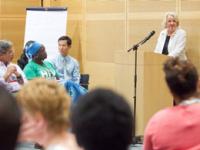 UNAIDS Deputy Executive Director, Management and External Relations Branch, Ms Jan Beagle addressed a meeting of funders committed to end mother-to-child transmission of HIV by 2015. Credit: UNAIDS/Anna Rauchenberger
UNAIDS Deputy Executive Director, Management and External Relations Branch, Ms Jan Beagle addressed a meeting of funders committed to end mother-to-child transmission of HIV by 2015. Credit: UNAIDS/Anna RauchenbergerContinuing UNAIDS' efforts to end mother-to-child transmission of HIV by 2015, earlier today, UNAIDS Deputy Executive Director, Management and External Relations Branch, Ms Jan Beagle addressed a meeting of funders already committed to this action, at a side event of the XVIII International AIDS Conference in Vienna.
Bringing together funders from around the world who are focused on HIV, reproductive health, and maternal and child health—including private foundations, family foundations, and corporations—the meeting provided an inspirational platform, addressing how these stakeholders can strengthen and align their responses.
Ms Beagle noted that in 2008 an estimated 280,000 children under fifteen died of HIV-related causes. Most of these children were under the age of five and were infected through their mothers either during pregnancy, labour and delivery, or through breastfeeding, and over 90% lived in Sub-Saharan Africa.
“By contrast, mother-to-child transmission of HIV has been almost eliminated in high-income countries,” said Ms Beagle. “It is an immense injustice that mother-to-child transmission of HIV has not yet been eliminated globally. It is achievable and doable across the world in a business timeframe i.e. by 2015.”
Ms Beagle encouraged those present to join the global effort and understand the role they can play to support unmet needs through financial and non-financial contributions.
On the benefits of preventing HIV infections in children, Ms Beagle noted, “Imagine the impact that it would have on families and communities, in terms of educated societies and productivity.”
Mother-to-child HIV transmission
An estimated 430,000 children were infected with HIV in 2008. However significant progress in ending mother-to-child transmission has occurred in recent years. In 2008 around 45% of pregnant women living with HIV in low- and middle-income countries received antiretroviral drugs compared with only 10% in 2004. Despite these successes, across the world each year over a million pregnant women risk passing along HIV to their child.
UNAIDS Executive Director Mr Michel Sidibé has called for the virtual elimination of mother-to-child HIV transmission by 2015 and efforts are gaining momentum around the world.
Preventing mothers from dying and babies from becoming infected with HIV is also one of UNAIDS’ key priority areas as outlined in its 2009 – 2011 Outcome Framework. UNAIDS calls for the scaling up of access to and the use of quality services for the prevention of mother-to-child transmission as an integral part of sexual and reproductive health services and reproductive rights for women, their partners and young people.
The event was hosted by Johnson & Johnson and co-partners included UNAIDS, Funders Concerned About AIDS, Global Business Coalition for HIV/AIDS, TB, Malaria, and the European Funders Group.
Right Hand Content
Partners:
Johnson & Johnson
Funders Concerned About AIDS
Global Business Coalition for HIV/AIDS, TB, Malaria
European Funders Group
External links:
International AIDS Conference 2010
Publications:
UNAIDS Outlook Report 2010 (pdf, 6 Mb)
UNAIDS Outcome Framework 2009-2011 (pdf, 388 Kb)
AIDS Epidemic Update 2009
Read speech by Ms Jan Beagle, UNAIDS Deputy Executive Director, Management and External Relations Branch

Feature Story
UNAIDS satellite explores paving the way towards virtual elimination of mother-to-child transmission of HIV
20 July 2010
20 July 2010 20 July 2010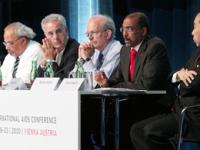
From left: Ambassador Eric Goosby, United States Global AIDS Coordinator; Professor Michel D. Kazatchkine; Executive Director, The Global Fund to Fight AIDS, TB and Malaria; Anthony Lake, Executive Director of UNICEF; Michel Sidibé, Executive Director of UNAIDS; Hiroki Nakatami, Assistant Director General of WHO; at the UNAIDS PMTCT Satellite at the 18th International AIDS Conference in Vienna, Austria on 19 July 2010. Credit: UNAIDS/Heimo Aga
UNAIDS hosted a satellite at AIDS 2010 on preventing mother-to-child transmission of HIV 19 July. It was co-chaired by Antony Lake, Executive Director of UNICEF and Hiroki Nakatani, Assistant Director General of World Health Organization (WHO) and coordinated by Gottfried Hirnschall, Director of the HIV department (WHO). Opening remarks were delivered by Michel Sidibé, Executive Director of UNAIDS and Michel Kazatchkine, Executive Director of the Global Fund to Fight AIDS, TB and Malaria, and Ambassador Eric Goosby, United States Global AIDS Coordinator.
The call to eliminate mother-to-child transmission of HIV was first made by UNAIDS Executive Director Michel Sidibé and he has since been joined by leaders of nations, heads of multilateral, bilateral, regional and national bodies, presidents of foundations, members of civil society, and even captains of football teams in the FIFA 2010 World Cup.
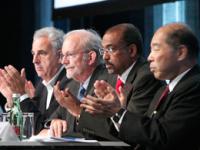
From left: Professor Michel D. Kazatchkine; Executive Director, The Global Fund to Fight AIDS, TB and Malaria; Anthony Lake, Executive Director of UNICEF; Michel Sidibé, Executive Director of UNAIDS; Hiroki Nakatami, Assistant Director General of WHO; at the UNAIDS PMTCT Satellite at the 18th International AIDS Conference in Vienna, Austria on 19 July 2010. Credit: UNAIDS/Heimo Aga
Addressing the satellite, Mr Sidibé noted that many African countries like Botswana, Namibia and Swaziland are already leading the way towards virtual elimination if mother-to-child transmission, and many others are close behind.
This groundswell of support is lending hope to the possibility that transmission of HIV from mothers to children can be virtually eliminated in the highest-burden countries by 2015. At the same time, the WHO has issued new recommendations on the use of antiretroviral drugs for treating pregnant women and preventing HIV infection in infants and HIV and infant feeding. The main purpose of the new recommendations is to improve maternal and child survival by drastically reducing risk to around 5%, including in breastfeeding populations.
WHO, UNICEF, UNFPA and UNAIDS have developed a PMTCT strategic vision through the UNAIDS Outcome Framework for 2009-2011, aiming at defining joint commitment to support scale up of PMTCT of HIV services and integration with maternal, newborn and child and reproductive health services.
A long way to go
Despite this momentum, many nations have a long way to go. The majority of pregnant women in low- and middle-income countries do not know their HIV status. This knowledge has risen from 7% in 2004 to 21% in 2008. Also, the majority of HIV-positive pregnant women who need antiretrovirals (ARVs) for preventing transmission of the virus to their child. Only 45% of women in need of ARVs received it in 2008, although this is up from 10% in 2004.

UNAIDS PMTCT Satellite at the 18th International AIDS Conference in Vienna, Austria on 19 July 2010. Credit: UNAIDS/Heimo Aga
The quadrupling of the proportion of women receiving this important service is good news. But children continue to be left behind. Around 32% of infants born to HIV-positive mothers received antiretroviral for PMTCT in 2008, up from 20% in 2007 and 6% in 2004.
Update
Yesterday’s satellite provided an update on global commitments to virtual eliminate mother-to-child transmission of HIV. Participants highlighted key policy and operational considerations in implementing comprehensive PMTCT services integrated with maternal health and family planning services, including the WHO 2009 guidelines on ARV drugs for treating pregnant women and preventing HIV infection in infants which were reviewed by Nathan Shaffer of WHO.
To put theory into perspective country experience was shared by Mpolai Moteetee, the PMTCT focal point in Lesotho's Ministry of Health and Social Welfare Family Health Division who spoke of the experience of rapid scale-up of PMTCT services in Lesotho.
Marie Deschamps of GHESKIO (Groupe Haïtien d’étude du Sarcome de Kaposi et des Infectieuses Opportunistes) presented on the importance of integration of broad range of services of maternal health, family planning, PMTCT, and HIV treatment for maternal and child survival
Lilian Mworeko of ICW (International Community of Women with HIV/AIDS) Uganda shared her personal perspective as an activist and a person living with HIV.
Mother-Baby Pack
UNICEF, in collaboration with WHO and global partners, has developed an innovative simple, user-friendly and affordable packaging mechanism to deliver PMTCT preventive medications, the Mother-Baby Pack (MBP). Chewe Luo, a UNICEF Senior Advisor, presented the Pack which contains medicines for prophylaxis, ARVs and Co-trimoxazole, for the mother and for the infant in line with WHO 2010 PMTCT Guidelines. It also intends to help streamline procurement and supply management of PMTCT medicines.
The Global Fund has also declared preventing mother-to-child transmission (PMTCT) a priority and is currently assessing the possibility of reprogramming existing grants to accelerate scale-up in 20 countries (Angola, Botswana, Burundi, Cameroon, Côte d'Ivoire, the Democratic Republic of Congo, Ethiopia, Ghana, Kenya, Lesotho, Mozambique, Malawi, Namibia, Nigeria, South Africa, Swaziland, Tanzania, Uganda, Zambia and Zimbabwe).
Caroline Ryan of PEPFAR shared how their efforts will contribute towards virtual eiliminaiton. PEPFAR II has aligned its target to the UNGASS targets aiming to provide PMTCT services to 80% of all pregnant women living with HIV and exposed infants in their country programmes. All these commitments fall within the context of integrated programming for improved maternal and child health and survival coordinated with current US Global Health Initiative.
Closing remarks at the session were delivered by Antony Lake and Hiroki Nakatani.
Right Hand Content
Publications:
UNAIDS Outlook Report 2010 (pdf, 6 Mb)
UNAIDS Outcome Framework 2009-2011 (pdf, 388 Kb)





